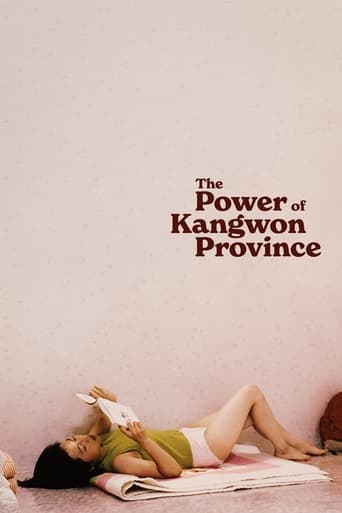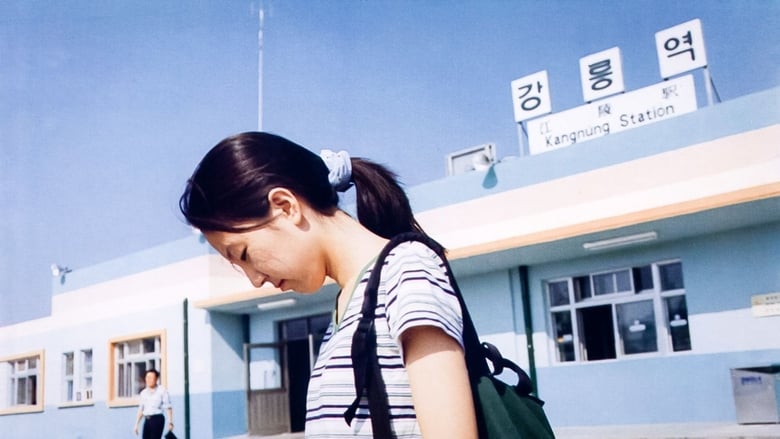The Power of Kangwon Province (1998)
After a breakup, a young woman goes to a mountain resort on vacation and falls for a married policeman. Unbeknownst to her, her ex is also vacationing there.
Watch Trailer
Free Trial Channels
Cast


Reviews
Very well executed
The Worst Film Ever
One of the most extraordinary films you will see this year. Take that as you want.
Through painfully honest and emotional moments, the movie becomes irresistibly relatable
Unfamiliar with the works of Hong Sang-soo, I started watching 'The Power of Kangwon Province'. In the early scenes of the film, you see a microphone appearing, used for recording sound. I paused the movie briefly and checked on Google, just to make sure that this was really a picture made by a critically acclaimed director. After Google gave me the confirmation, I finished the movie in one go, satisfied about my first encounter with director Hong.'The Power of Kangwon Province' is a South Korean drama, first released in 1998 and is written and directed by Hong Sang-soo. This film was Hong's second and other praised movies by Hong are 'The Day a Pig fell into a Well' and 'Virgin Stripped Bare by her Bachelors'. The movie stars Oh Yun-hong as student Ji-sook and Baek Jong-hak as college professor Sang-kwon. I also recognised Kim Yoo-suk as a policeman. Kim played one of the leading roles in 'The Isle'.The Kangwon province, with mountains and forests, is located in the north eastern part of South Korea and the demilitarised zone splits up the area and continues into North Korea. This movie however is not about the Korean divide, but about relationships. 'The Power of Kangwon Province' tells actually two stories. The first part of the movie is about Ji-sook, who is on a trip to the Kangwon province with her two girlfriends, where she strikes up a fling with a policeman. The second part of the film involves the story of Sang-kwon, a husband and father, who visits the mountains of Kangwon for leisure together with a friend. Both men end up in the arms of a prostitute. During the movie, by coincidence both stories cross each other and at the end of the movie director Hong connects the two stories together.The style of filming, editing and use of music is very minimalistic, but the end result is intriguing. Every camera shot is a steady shot that doesn't zoom in or out or moves sideways, followed by a hard cut to the next shot. Music only plays at the beginning and ending. By the way that Hong is filming, you really feel connected to the actors and therefore closer to Hong's dim view on relationships between man and a woman. You feel the pain and sorrow of Ji-sook when she returns from Kangwon by bus and cries and cries and cries. Even the sex scenes feel so sad and basically Hong managed to remove the sex out of the sex scenes.It is unclear to me why Hong left in the scenes where the microphone is noticeable, as mentioned in the introduction. 'The Power of Kangwon Province' is however worth watching for its unusual minimalistic style and the underlying depressing note of the film. If you are in a positive mood, then I would recommend you to wait watching this movie, as it affects your mood significantly, but if you have the chance to see this picture, please do so. Overall rating: 6.9
This is a great film. If this is any indication, than Hong Sang-Soo really is "Asian cinema's best kept secret". It's very similar in style to Tsai Ming-Liang and Hou Hsiao-hsien, and covers a lot of the same ground as them thematically, but I think I actually enjoy this more as a whole than any single one of their films. The overt minimalism is slightly less pronounced here than in their work, although it still completely fits that style (the camera never moves even once), and somehow I found the film less self-consciously "slow" than Tsai Ming-Liang or Hou Hsiao-hsien, which I think is part of the reason I enjoyed it more. Plus, it doesn't keep it's subjects quite as detached as Hou does. I felt like the film was also somehow more "complete" and less open-ended (just barely) than some of their work, although that's not to say it had much of anything resembling a forward-moving plot. I would have a hard time believing that Sophia Coppola wasn't directly influenced by this film for "Lost in Translation" (scenes of a young woman wandering around by herself, and languishing in her hotel room wearing punk panties can't help but seem familiar).
In the film Kongwon-do ui him it features a relatively intimate look into the meaningfulness (as well as general meaninglessness) into the lives of various Koreans; empty people seeking ways to fill themselves, enjoying the escapism of nature. From the beginning to the end of the film we observe the fallibility of the various characters; we learn of their shortcomings and their desires, the overall complexity captured within human life (and yet the overal simplicity of humanity). Although the film is slow-moving, it can be very contemplative. It does not force any ideas, but allows the ideas to come about themselves, it allows the concepts to reveal themselves.The film ends as well and as suddenly as it begins, and one truly understands the meaning of aloneness, that love is often an act of selfishness, and the many mistakes that we make. It is a look into everyday life, very well and beautifully done.If you are looking for action or for intense drama, this is not the film for you. However, if you enjoy honest, original, and meaningful films that are not forced and without glitz, this is a great film to watch.
A common plotline in films consists of the main characters leaving the hustle and bustle of the city behind, and finding themselves in the tranquility of nature. In Power of Kangwon Province, we are shown two stories of individuals doing just that, trying to find themselves through a trip to the popular Korean parks in the mountains of Kangwon Province. However, rather than epiphanal moments, we have two characters whose trip into nature was just another form of escape.The pace of this movie is slow, contemplative. We learn in the end what really brought each to Kangwon Province and we learn how they're connected. For those who want Hollywood glam and for a movie to give them a definitive answer, this movie will not satisfy. But for those who want a movie that leaves them thinking, wondering, affecting them years after, this movie will more than satiate that longing.








